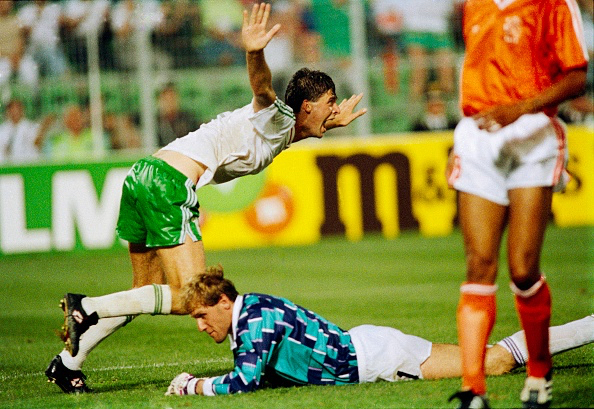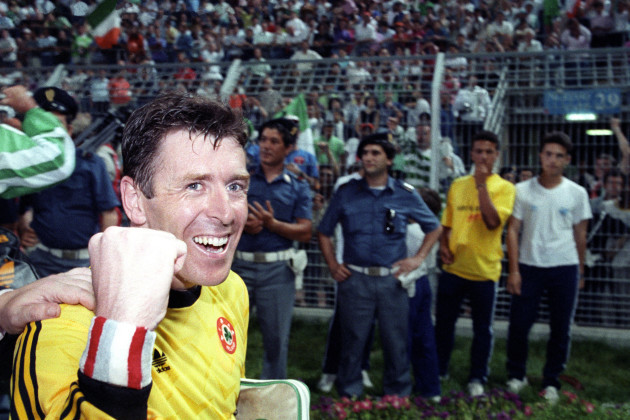IT WAS AN historic World Cup moment. The first of its kind. Though for such a new, shiny development, the production values left a lot to be desired.
But, you could understand Fifa’s predicament. It was pretty difficult to jazz up the drawing of lots.
Senegal and Japan came very close on Thursday but the record remains: it’s been 28 years since the odd, unforgiving group-stage tiebreaker was last used.
Of course, at Italia ’90, the circumstances were a little different.
After the initial optimism of the 1-1 draw against England in their opening Group F game, the handbrake was unceremoniously deployed after the Republic of Ireland’s scoreless draw against Egypt.
Back home, Eamon Dunphy infamously criticised an insipid display but later flew to Palermo for the build-up to the decisive fixture against the Netherlands.
By that stage, Jack Charlton was already prickly and irritated. The Egyptians had left him angry and frustrated. He never admitted it but the result felt like a defeat.
Now, Ireland needed to get something against the Dutch, the reigning European champions.
“I hate teams like that, I deplore them,” he said after the game, referring to the African side.
“I’ve seen results that were amazing over the years but I’ve never before played a team that didn’t create one chance in 90 minutes. The Dutch match will be a good game. At least they will come and have a go at us, and we’ll come and have a go at them.”
Charlton later fielded some questions about Dunphy’s appraisal of the Egyptian game but attention quickly turned to the crucial clash with the Dutch and, if not buried, the story certainly seemed to be parked.
But, the atmosphere completely changed when Dunphy arrived in Italy and turned up for the pre-game press conference.
“Hell broke loose,” Charlton later said.
When Dunphy asked a question, Charlton refused to answer it.
“You’re not allowed to ask a question…Anyone else?” he said.
“I beg your pardon?” Dunphy snapped back.
“You’re not allowed to ask a question,” Charlton repeated.
“You’re not a proper journalist. These lads here are interested in football and you’re not. So we’re not answering questions from you.”
“I’m here from the Sunday Independent – we have 900,000 readers,” Dunphy responded, defiantly.
“End of story,” offered Charlton, who then promptly walked out.
He went into more detail with reporters later on, giving them the copy they thought they’d lost out on earlier in the day.
“I do not have to work with people I do not like,” he explained.
I think he is a very bitter little man.”
Running alongside the Charlton/Dunphy controversy was also the anger of many Irish fans who had travelled to try and pick up tickets for the Dutch game. Some had queued up through the night but as many as a thousand were left disappointed. Tired and angry, some began to heckle the FAI officials who were present.
The Irish Times seemed to capture the pessimism of the moment by declaring the death of Irish football’s ‘age of innocence’.
And when Ruud Gullit put the Dutch in front after just 11 minutes at the Stadio La Favorita, everyone feared the worst.
But, Niall Quinn made the most of a couple of defensive errors to bundle the ball home with 20 minutes left.
Then the fun started.
In his autobiography ‘Captain Fantastic’, Mick McCarthy details speaking with Dutch skipper Gullit and agreeing that the teams would shadow box for the remainder of the game. A 1-1 draw would eliminate Egypt (Charlton getting his own back) and ensure both sides progressed to the knockout round.
In theory, it seemed a smart move.
But Gullit and the Netherlands would come to regret it.
Because the 1-1 draw also ensured that both sides were level on points, on goal difference and on goals scored. And, they couldn’t be separated using the head-to-head scenario either.
That meant second and third place in Group F would be decided by the final tiebreaker: essentially, drawing names out of a hat.
Obviously, Fifa gave it as much pazzatz as possible. So, there was a live TV feed of the event and everything was played out on a stage with Sepp Blatter, then Fifa’s General Secretary, as master of ceremonies.
The logistics were pretty straightforward. In one bowl were the names of the teams. In the other, the positions they were vying for.
It was simple. If Ireland finished as runners-up in the group, they would face Romania in Genoa. If they finished third, it was world champions Germany in Milan.
Leo Beenhakker’s side came out first but they drew third place and the Irish conjured a lucky escape.
RTE carried coverage of the draw in Rome and George Hamilton’s relief was palpable as he delivered the crucial news-line:
“Ireland play Romania and the Netherlands play the West Germans.”
The lots had been kind.
Was Gullit fully aware of the permutations when he agreed to McCarthy’s on-field proposition? Did he even know the drawing of lots was a possibility? It certainly wasn’t ideal to face Germany so early in the tournament, though the Dutch camp was immersed in its own chaos at the time.
In a profile of Gullit years later, Simon Kuper wrote:
Before the World Cup, he forced out Holland’s manager. During the World Cup, he quarrelled with the team’s new manager and with a former manager, unleashed a newspaper war between the two main Dutch dailies, and, though unfit, demanded the lead role in the team.”
Thijs Libregts had been ousted during qualification and, after the players voted, it seemed Johan Cruyff would get the nod. However, Beenhakker was appointed instead, much to the players’ chagrin. It didn’t help with the mood in the camp and things never got off the ground.
On 24 June, they suffered a 2-1 defeat to Germany and headed home. It said much about their performances that the standout moment of their tournament was Frank Rijkaard spitting at Rudi Voller after the pair had been sent-off.
The following day, a nation held its breath.
Bonner saved, O’Leary scored and Irish football history changed forever.
Within a matter of days, the age of innocence had been reborn.
The42 is on Instagram! Tap the button below on your phone to follow us!




